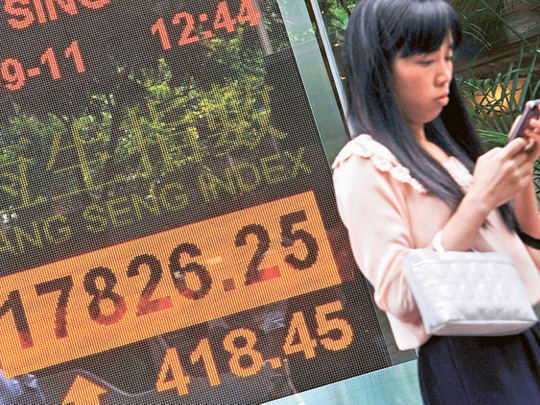
Hong Kong: Asian tech shares haven't been immune from the global selloff in speculative assets, but investors are sifting through the ashes and some see buying opportunities.
JPMorgan Asset Management is suggesting that investors buy the dip as combined losses in the region's technology and consumer discretionary sectors hit about $690 billion from their first-quarter peaks. Pictet Asset Management says Asia's tech exporters are "vital to the world" and will see their roles grow.
It's mainly "a valuation story, more than anything else," and the selloff will unlikely last, said Kerry Craig, global market strategist at JPMorgan Asset. "There is still a very strong buy-a-dip mentality for a lot of investors."
The world's riskiest assets have experienced a turbulent month amid concern about speculative froth and rich valuations. Everything from cryptocurrencies to high-profile innovation funds have been hit. And in Asia, Taiwanese shares, Japanese startups and Chinese internet stocks were among the highest profile casualties.
The MSCI Asia Pacific Information Technology Index fell as much as 8.4% this month before paring losses. The sentiment seeped into the broader market, with the regional benchmark briefly entering into technical correction.
Secular growth
While Andy Budden, investment director at Capital Group sees a bumpy journey ahead for Asian stocks, he acknowledges the secular trends that underpin investor interest in technology stocks. Digitalisation has accelerated in the past year and is set to continue, while AI and machine learning, autonomous vehicles and virtual reality are advances which could be major drivers of growth over time, he said.
"Select secular growth names present attractive value, as stellar results are overshadowed by market sentiments on growth and inflation," said Andy Wong, senior multi-asset investment manager at Pictet Asset Management. Asia's "semiconductor players and equipment makers are vital to the world, while mega cap tech's dominance is rising, and profitability improves as scale increases."
Perhaps the most visible structural trend in Asian technology this year has been Taiwan's increasing dominance of the chip manufacturing industry. That didn't spare the island's stocks from a deep rout this month - led by declines in Taiwan Semiconductor Manufacturing Co.
But Irene Goh, head of multi-asset solutions for Asia Pacific at Aberdeen Standard Investments, is positive on Taiwanese tech, not least because of TSMC's global strategic position.
"Taiwan covers important tech food chains benefiting from the long-term positive tech cycle, which forms our constructive view on Taiwan given the strong macro support from tech export and fixed investment," Goh wrote in a note this month.
Taiwan's benchmark Taiex index rebounded 3% this week, after losing around 10% in the previous two.
Rotation situation
Still, other investors remain cautious toward highly priced technology stocks, especially as the rise in global bond yields threatens valuations and the return of inflation favors their cyclical peers.
"Asia continues to lead the investor rotation from growth to cyclical and value stocks, and I think this trend will continue," said David Chao, global market strategist for Asia Pacific ex-Japan at Invesco. "Higher yields and the discount rate make growth stocks that rely on future earnings for their lofty valuations all that more expensive."
Asia's tech gauge is trading on 18 times 12-month forward earnings compared with a peak of 22 times in January. But that's still well above the ten-year average of 14 times, according to data compiled by Bloomberg.
Virus complications
Another complicating matter for Asia bulls is the recent rise in coronavirus infections in the region, which is leading to fresh measures to control the spread in places like Singapore, Taiwan, Malaysia and Japan. That has dented the sense among investors last year that Asia had a better handle on the coronavirus's spread than global peers.
But Invesco's Chao remains of the view that Asia's governments will continue to quickly contain new waves of infection.
"I would be a buyer on any knee-jerk sell actions due to Covid-19 spikes," said Chao. "Market participants are perhaps already seeing through some of these pandemic-related restrictions and imagining what a post-pandemic regional economy will look like."












